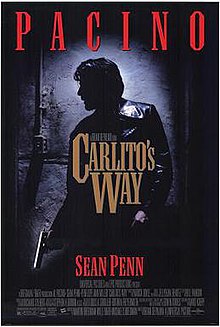Carlito's Way
| Carlito's Way | |
|---|---|

Theatrical poster
|
|
| Directed by | Brian De Palma |
| Produced by |
Martin Bregman Michael Scott Bregman Willi Bär |
| Screenplay by | David Koepp |
| Based on |
After Hours by Edwin Torres |
| Starring | |
| Music by | Patrick Doyle |
| Cinematography | Stephen H. Burum |
| Edited by | Kristina Boden Bill Pankow |
|
Production
company |
Epic Productions
Bregman/Baer Productions |
| Distributed by | Universal Pictures |
|
Release date
|
|
|
Running time
|
144 minutes |
| Country | United States |
| Language | English |
| Budget | $30 million |
| Box office | $63.8 million |
| Carlito's Way: Original Motion Picture Score | |
|---|---|
 |
|
| Film score by Patrick Doyle | |
| Released | 1993 |
| Genre | Soundtrack |
| Label | Varese Sarabande |
| Carlito's Way: Music From The Motion Picture | |
|---|---|
 |
|
| Soundtrack album by Various Artists | |
| Released | November 9, 1993 |
| Genre | Soundtrack |
| Label | Sony |
Carlito's Way is a 1993 American crime film directed by Brian De Palma, based on the novels Carlito's Way and After Hours by Judge Edwin Torres. The film adaptation was scripted by David Koepp. It stars Al Pacino, Sean Penn, Penelope Ann Miller, Luis Guzman, John Leguizamo, Jorge Porcel, Joseph Siravo and Viggo Mortensen.
The film is based mainly on After Hours, but used the title of the first novel to avoid it being confused with Martin Scorsese's 1985 film of the same name, and focuses on Carlito's activities once he is released from prison. Carlito Brigante, a fictional Puerto Rican criminal vows to go straight and to retire in paradise. However, his past will not let him, and he unwittingly ends up being dragged into the same criminal activities that got him imprisoned in the first place.
Carlito's Way received a mixed response from critics, with a similar lukewarm result at the box office, but has subsequently gained a cult following. Both Sean Penn and Penelope Ann Miller received Golden Globe nominations for their performances. A prequel titled Carlito's Way: Rise to Power, based on the first novel, was filmed and released direct-to-video in 2005.
...
Wikipedia
